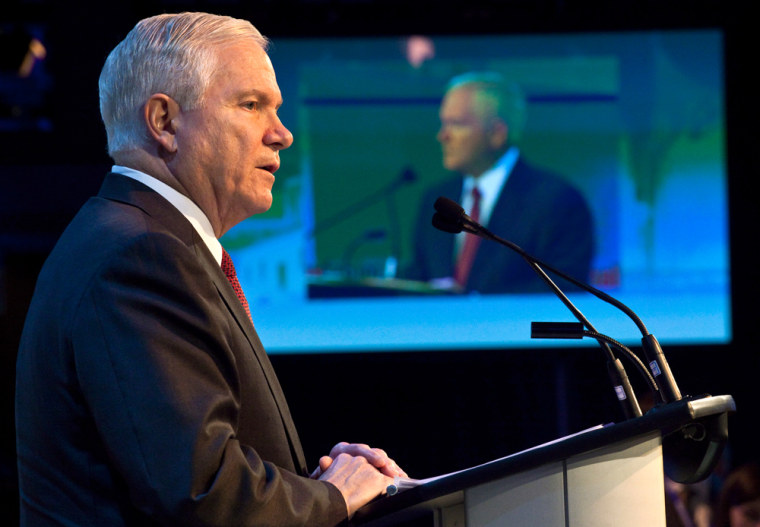The United States will do its part to reduce corruption in Afghanistan by examining its own contracts and projects, even as it is demanding the same from the Afghan government, Defense Secretary Robert Gates said Friday.
He said the U.S. can exert the most leverage when it is signing the checks.
"The place for us to start is to deal with corruption that may be associated with contracts we're letting or work that we're having done and development projects that we are undertaking in partnership with others including with the Afghans," Gates said.
Gates spoke to reporters at the historic military fort carved into Halifax's Citadel Hill, just prior to the start of the first Halifax International Security Forum, which is exploring a broad range of issues from Afghanistan and China to Arctic and port security.
Afghan President Hamid Karzai has promised to do more to head off corruption that outside analysts say is rampant. But the newly re-elected leader has also chafed under international criticism of corruption in his government. He has pointed out that the flood of development cash into his country over the past eight years has promoted some of the graft.
Standing with Canadian Defense Minister Peter MacKay, Gates said the U.S. military is planning for the eventual withdrawal of Canadian and Dutch troops, set for 2011 and 2010 respectively.
"I think it is sustainable," he said, adding that the top U.S. commander in Afghanistan, Gen. Stanley McChrystal "is planning appropriately."
Transfer timetable
President Barack Obama is expected to announce an increase of thousands more U.S. troops to Afghanistan in the coming weeks. And U.S. leaders have stressed the need for other nations to up their commitments as well.
But NATO and some allies, including Germany, have said they will wait to make any decisions until after the U.S. has made its announcement. The U.S. has a record American force of more than 68,000 in Afghanistan.
Asked about Obama's goal to not pass the conflict on to the next president, Gates declined to be specific. He would only say he hopes that "in a reasonable amount of time" the U.S. and its allies could begin transferring security to the Afghans and withdrawing U.S. forces.
"The exact timing will depend clearly on substantial measure on conditions on the ground but I think everybody's hope is that it will come sooner rather than later," Gates said.
A short time later, in a speech to the security conference, Gates called for other nations to do what they can in the eight-year-old Afghanistan war, saying it will require more commitment and sacrifice from U.S. allies.
He said allies will need to exercise more patience in the "noble and necessary campaign."
Canada currently has more than 2,800 troops deployed in Afghanistan, and has suffered one of the highest per-capita losses in the war, with as many as 130 killed in the war.
Eye on the Arctic
Gates — hamstrung by the secrecy surrounding Obama's ongoing troop deliberations — turned much of his speech toward other challenges faced by the international community, including America's neighbors to the north.
Pointing to the increased maritime traffic through the Northwest Passage, Gates said the U.S. and its allies must keep an eye on Russia's efforts to expand its activities in the Arctic.
"Even as the U.S. 'resets' relations with Russia, we will work with Canada to ensure that increased Russian activity in the Arctic does not lead to miscalculation or unnecessary friction," Gates said.
Russia, the United States, Canada, Denmark and Norway have been trying to assert jurisdiction over parts of the Arctic, which is believed to contain as much as 25 percent of the Earth's undiscovered oil and gas. Russia, in 2007, laid claim to parts of the Arctic seabed, and last month unveiled an effort to map the region in order to justify its claims.
Gates added that the melting of the polar ice cap in the Arctic, along with the potential need for military humanitarian assistance, "calls for a greater attention to the security implications of climate change."
A senior U.S. defense official said Thursday that the U.S. and Canada are looking for ways to increase surveillance in the Arctic region as maritime traffic through the frozen north grows — spurred on by global warming and the melting ice caps.
He said that for the first time, the Pentagon's quadrennial review will examine the U.S. armed forces' ability to respond to the impact of global warming.
